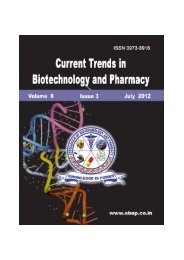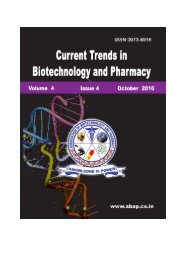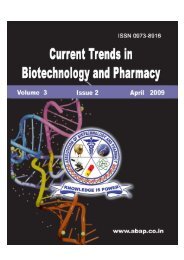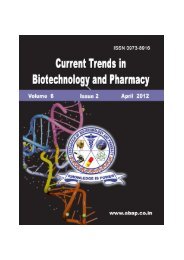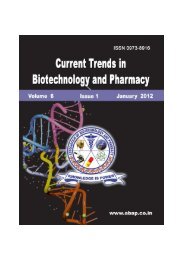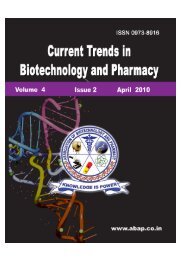KRS July Final Jour.09. - Association of Biotechnology and Pharmacy
KRS July Final Jour.09. - Association of Biotechnology and Pharmacy
KRS July Final Jour.09. - Association of Biotechnology and Pharmacy
You also want an ePaper? Increase the reach of your titles
YUMPU automatically turns print PDFs into web optimized ePapers that Google loves.
Current Trends in <strong>Biotechnology</strong> <strong>and</strong> <strong>Pharmacy</strong><br />
Vol. 3 (3) 225 - 240, <strong>July</strong> 2009. ISSN 0973-8916<br />
passing specific laws, can what can or cannot be<br />
patented. If an invention is considered by various<br />
special interest groups to have a potentially<br />
negative impact on an existing agricultural<br />
practice, for example, then it is quite possible that<br />
a law preventing the implementation <strong>of</strong> the new<br />
technology could be passed<br />
Experimental use exemption<br />
In some cases, the courts have<br />
recognized what has come to be known as an<br />
experimental use exemption, or research<br />
exemption, from infringement liability. On its<br />
face, the patent statute does not appear to permit<br />
any unlicensed use <strong>of</strong> a patented invention, in<br />
research or otherwise, but language in some<br />
judicial opinions nonetheless suggests that use<br />
<strong>of</strong> a patented invention solely for research or<br />
experimentation is, in principle, exempt from<br />
infringement liability. The experimental-use<br />
doctrine was first expounded in 1813 by Justice<br />
Story in dictum in the case <strong>of</strong> Whittemore v.<br />
Cutter16. Here the legal term dictum refers to<br />
something said in a judicial opinion that was not<br />
necessary to resolve the case before the court,<br />
<strong>and</strong> therefore does not create binding precedent<br />
in subsequent cases.<br />
He observed “that it could never have<br />
been the intention <strong>of</strong> the legislature to punish a<br />
man who constructed [a patented] machine<br />
merely for philosophical experiments or for the<br />
purpose <strong>of</strong> ascertaining the sufficiency <strong>of</strong> the<br />
machine to produce its described effects”. It is<br />
difficult to discern the scope <strong>of</strong> this exception<br />
with any precision, inasmuch as experimental use<br />
becomes an issue only in patent infringement<br />
actions, <strong>and</strong> patent holders are unlikely to file a<br />
lawsuit against an academic researcher whose use<br />
<strong>of</strong> the invention is commercially insignificant.<br />
Judicial pronouncements on the scope <strong>of</strong> the<br />
experimental use exemption address situations<br />
in which a patent holder has found a defendant’s<br />
activities sufficiently annoying to be worth the<br />
234<br />
trouble <strong>of</strong> pursuing a lawsuit; this factor has<br />
undoubtedly skewed the distribution <strong>of</strong> cases in<br />
which the defense arises toward cases with high<br />
commercial stakes. Within this universe, the<br />
experimental use defense has been frequently<br />
raised, but almost never sustained. Nonetheless,<br />
courts have consistently recognized the existence<br />
<strong>of</strong> an experimental use defense in theory, although<br />
the defense has almost never succeeded in<br />
practice.<br />
Recent case law suggests that the<br />
experimental use defense may be available only<br />
for pure research with no commercial<br />
implications, if such a thing exists. In Roche<br />
Products v. Bolar Pharmaceutical Company (17),<br />
1984 decision <strong>of</strong> the US Court <strong>of</strong> Appeals for the<br />
Federal Circuit,the court rejected the arguments<br />
<strong>of</strong> a generic drug manufacturer that the<br />
experimental use defense should apply to its use<br />
<strong>of</strong> a patented drug to conduct clinical trials during<br />
the patent term. The purpose <strong>of</strong> the trials was to<br />
gather data necessary to obtain FDA approval to<br />
market a generic version <strong>of</strong> the drug as soon as<br />
the patent expired. The court characterized the<br />
defense as “truly narrow”, noting that the<br />
defendant’s use <strong>of</strong> the drug was “no dilettante<br />
affair such as Justice Story envisioned”.<br />
“The court held that the defense does not<br />
permit unlicensed experiments conducted with a<br />
view to the adoption <strong>of</strong> a patented invention for<br />
use in an experimenter’s business, as opposed to<br />
experiments conducted for amusement, to satisfy<br />
idle curiosity, or for strictly philosophical inquiry.<br />
Although it is not entirely clear what sort <strong>of</strong><br />
research the court would exclude from<br />
infringement liability as a mere “dilettante affair”,<br />
the language <strong>of</strong> the decision <strong>of</strong>fers little hope <strong>of</strong><br />
an exemption for research scientists who use<br />
patented inventions with an aim to discover<br />
something <strong>of</strong> potential usefulness. It certainly<br />
suggests that the defense would be unavailable<br />
whenever the defendant’s research is motivated<br />
Firoz et al



